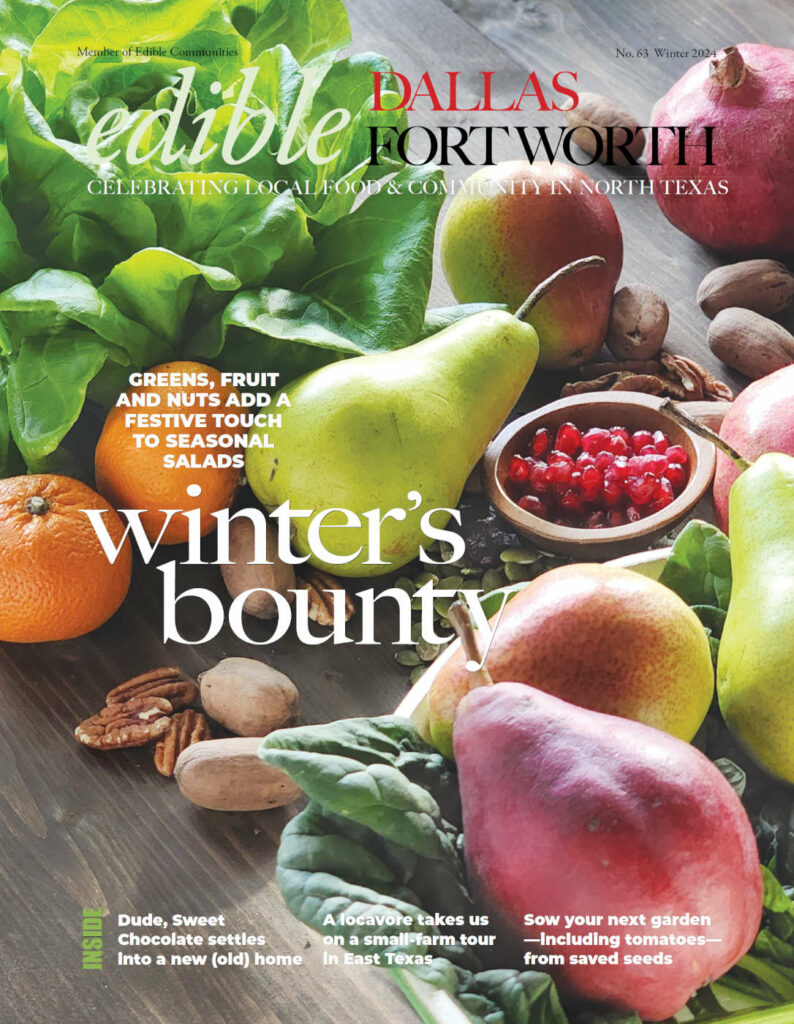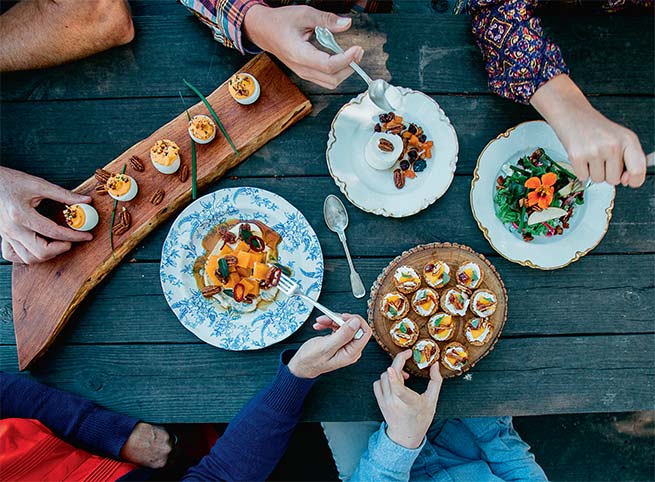
Today, the quest for “clean” food, grown as naturally as possible, is leading more consumers to seek out local farmers and ranchers. This goes beyond the desire for fresh flavors, which has driven the locavore movement since its inception. We want to know about how the cows and chickens are raised—did they live happy, healthy lives?—as well as how the fruits and vegetables are grown—without harmful pesticides and herbicides. Marie Tedei at Eden’s Garden CSA Farm was an early adopter of the “clean” concept, both with her farmers market and as a food activist. Her farm was the site of the first Chefs for Farmers event and more recently for an Outstanding in the Field dinner.
Compared to a decade ago, we also have vastly more artisan foods to choose from— from small-batch Lost Ruby Ranch chèvre to trendy macarons of every stripe. And we can thank the Texas Cottage Food Law for expanding our access to a broad array of home-prepared goods—pickles to croissants.
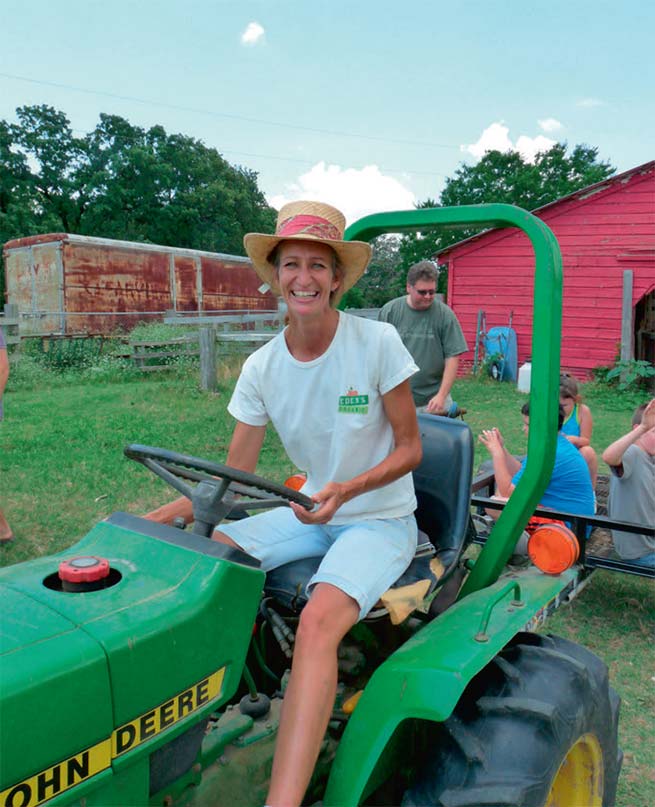
MORE FRESH, GOOD STUFF
We’ve seen the variety in Texas produce expand dramatically. The buzziest item: strawberries, which were virtually nonexistent at Texas farms ten years ago. Now, growers and pick-your-owns can’t keep up with demand. (We especially love the low-sugar spread Highway 19 Produce and Berries in Athens cooks up with its most fragile berries.) Lettuces and greens are far more abundant at farmers markets and restaurants these days, thanks in part to hydroponics. So are super-nutritious microgreens, from growers as diverse as pioneering Cardo’s Sprout Farm and Moss Haven Farm at Moss Haven Elementary School. Burgundy-colored okra, asparagus, baby bok choy, watermelon radishes and celery are just a few of the cool veggies we’re seeing at farmers markets and restaurants.
BREAD AND CHEESE, PLEASE
Breads and cheese have come along at a slower pace than some artisan foods, but with no less delicious results. An early supporter of the artisan scene, Empire Baking Co. in Inwood Village not only makes a mean French baguette and pain au levain, but is a longtime presence at farmers markets, filling in the bread gap. A new location is set to open in The Hill later this year. So, too, Village Baking Co. has been bringing its baked goods to area farmers markets, before it even had a retail store. Along the way, a handful of small bread-bakers have joined the ranks at farmers markets, most notably D’s Sourdough, at the Dallas Farmers Market, which started under the Texas Cottage Food Law.
Cheesemakers like Veldhuizen, which gave us Redneck Cheddar and Bosque Blue, and Full Quiver Farms, famed for its cream cheese spreads and fresh mozzarella, have been around more than a decade—so long in the case of Full Quiver that the Samses’ sons have taken over the operation. Meanwhile, the “new” kids on the cow’s milk scene are the Jersey Girls Dairy in Winnsboro. Latte Da Dairy is our enduring farmstead goat cheese-maker, with awardwinning fresh chèvre as well as a number of goat-milk cheeses that traditionally have featured cow’s milk, including “Cotzwold” and pepper jack. Newbie Lost Ruby Ranch specializes in creamy chèvre, and owner Paul Allen has not been able to keep pace with demand since he started his “retirement” project five years ago. He’s up to 90 goats with more kids on the way.
The passage of the Texas Cottage Food Law in 2011 green-lighted home cooks with a knack for baking, canning and pickling to legally sell what they made in their kitchens.
THE COTTAGE FOOD LAW: BEFORE AND AFTER
The passage of the Texas Cottage Food Law in 2011 green-lighted home cooks with a knack for baking, canning and pickling to legally sell what they made in their kitchens. This opened the way for a huge infusion of delicious, home-made foods at farmers markets—no less than Forbes magazine estimated conservatively that the law added a thousand producers in Texas in 2014. Locally, the Swedish Sisters and the Rosemary Bakery both got their start under this law, as did Greek Mama’s Bites, Square Garden Pickles and Bonnie Jean’s Preserves and Breads, to name a few. Go to any farmers market, and you’ll find plenty of others. Now if we can just get the lege to move beyond pickles. The way the law was written, other home-pickled vegetables, like okra and carrots, aren’t legal. Yet.
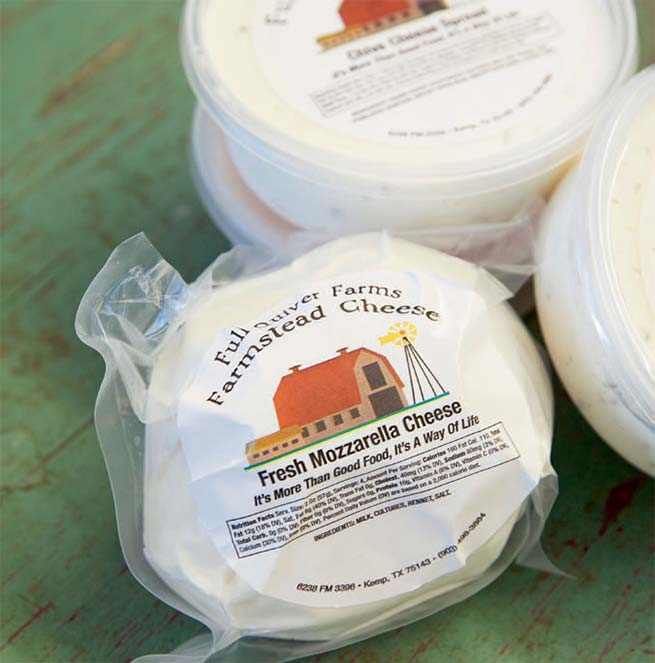
DEMAND FOR CLEAN MEAT
Nowhere has the interest in clean food been as intense as with meat, and our farm-ranch community has stepped up. In just the past 18 months, two butcher shops dedicated to local, grass-fed beef have opened in Dallas: Deep Cuts in North Dallas and The Meat Shop on Lovers Lane. Burgundy Pasture Beef added its third storefront, in Dallas, and 2S Ranch opened its Provision House in North Dallas. Early on, both Burgundy Beef and Local Yocal Farm to Market fueled the movement, building butchering facilities to serve small producers, such as JuHa Ranch. All the beef producers also either raise chickens or partner with a farm that does, such as Windy Meadows Family Farm and Cobb Creek Farm. Both of those farms also offer humane harvest for birds.
AN ARTISAN SUCCESS STORY
Eleven years ago, Paul Wackym took a big gamble. He left the world of fashion design and high-end food marketing to make and sell his own line of cookies at local farmers markets. Now Wackym’s Kitchen has nearly two dozen cookie varieties in retail outlets coast-to-coast. But Wackym’s never forgotten his farmers market roots, and to this day you’ll find him every Saturday at Coppell Farmers Market. He’s the guy in the funny hat handing out samples of his latest, greatest. We love his Cornmeal Rosemary Shortbread and Hatch Cheese Nibbles.
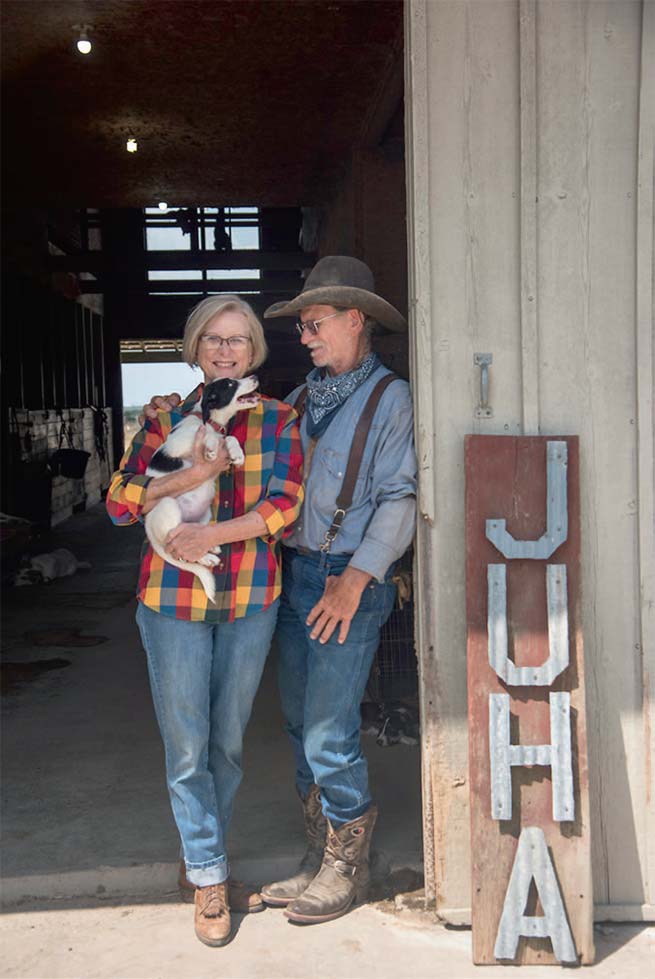
BARBECUE RESPECT
Back in the day, Dallas could point to Sonny Bryan’s for iconic Texas barbecue. But in modern times, the Hill Country, with the likes of Franklin, Mueller and Kreuz, eclipsed North Texas. All that changed when Justin and Diane Fourton opened Pecan Lodge at the Dallas Farmers Market in 2010. Sheer force of flavor catapulted the couple to statewide fame—and their own freestanding restaurant and pit in Deep Ellum. Todd David’s Cattleack also soared a few years ago, securing statewide fame on word-of-mouth. Good for North Texas to be back in the ‘cue game.
TWO CHEFS TAKING FARM-TO-TABLE HIGHER
No chef has been a more enduring advocate for farm-to-table dining than Graham Dodds, who was the first chef at Bolsa (with its novel, some might say laughable, no-walk-in-freezer concept). e avid beekeeper went on to helm uber-local, gardenflanked Wayward Sons and ultimately oversaw the development of restaurants at the restored Statler Hotel before moving on last fall. Now he’s scouting a new project, as intent as ever on turning to his rancherfarmer partners.
Matt McCallister has also taken farm-totable to extremes, albeit di erently. With his new Homewood by the Park Cities, he will ease up on the hyper-local sourcing he valiantly practiced at FT33, but will still retain a strong local focus (including patio raised-garden beds). D Magazine reports that he sent sta to eat at Stone Barns Center for Food and Agriculture, “arguably the country’s best seasonal, farm-to-table laboratory and restaurant,” as well as a fermentation class in the Hudson Valley. We are also looking forward to more of his cool foraging treks.
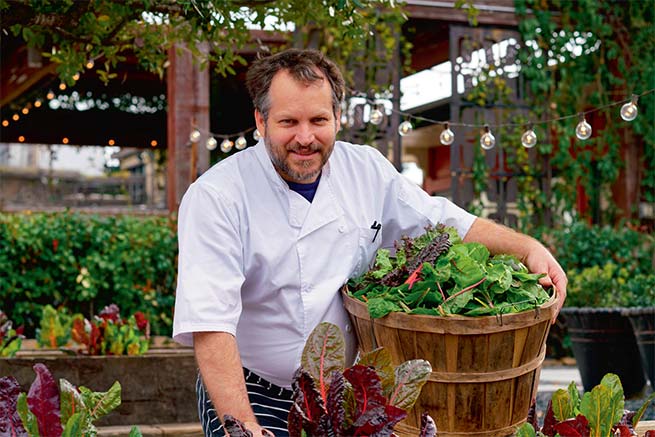
ENDURING COWTOWN
In the whirlwind of change we’ve witnessed over the past decade, one constant has endured: the farmer-run Cowtown Farmers Market in Fort Worth. No other market harkens back so clearly to the farmers markets of old, when farmers, ranchers and artisans sold only what they had grown or produced. No frills, no apologies. e vendors still set up every Saturday, year-round, come rain or come shine. We love what we’ve found there: young celery, ripe tomatoes, asparagus, strawberries and the best baby tomato plants ever.
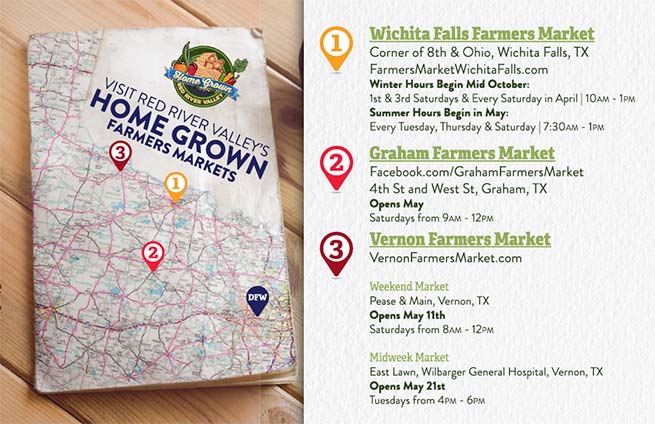
KIM PIERCE is a Dallas freelance writer and editor who’s covered farmers markets and the locavore scene for some 30 years, including continuing coverage at The Dallas Morning News. She came by this passion writing about food, health, nutrition and wine. She and her partner nurture a backyard garden (no chickens – yet) and support local producers and those who grow foods sustainably. Back in the day, she co-authored The Phytopia Cookbook and more recently helped a team of writers win a 2014 International Association of Culinary Professionals Cookbook Award for The Oxford Encyclopedia for Food and Drink in America.
- Kim Piercehttps://www.edibledfw.com/author/kpierce/
- Kim Piercehttps://www.edibledfw.com/author/kpierce/
- Kim Piercehttps://www.edibledfw.com/author/kpierce/
- Kim Piercehttps://www.edibledfw.com/author/kpierce/


